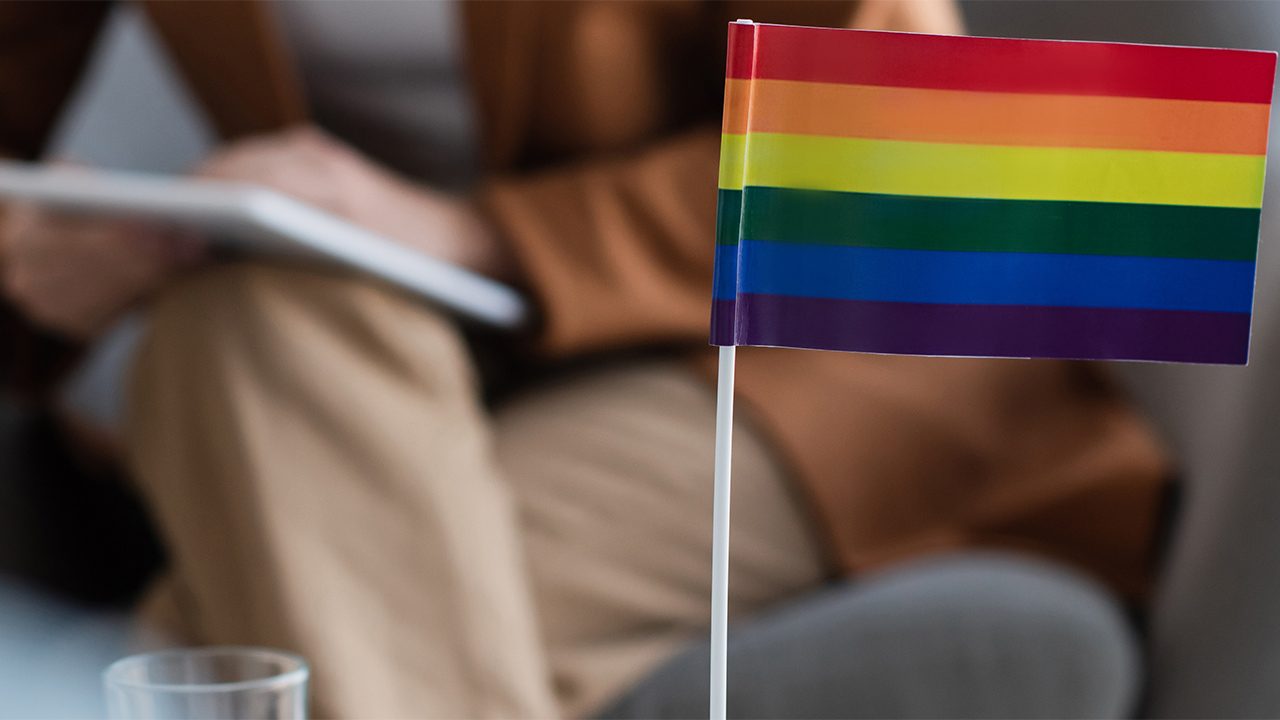SUMMARY
This is AI generated summarization, which may have errors. For context, always refer to the full article.

MANILA, Philippines – Maybe you’ve been grappling with your sexuality for a while, and you’re slowly starting to feel ready. There’s suddenly a shift within.
“I’m ready to come out,” you tell yourself, as you bask in the feeling of finally feeling comfortable and proud enough of who you are. You’re ready to tell the world and come out of the closet!
You no longer want to hide your sexuality, but you’re also feeling scared. How do I come out? How prepared am I? If you’re feeling both excited and worried about making the big announcement, you your feelings are completely valid and normal, and you are definitely not alone.
It’s a personal process that has no strict timeline or pace – how and when you embark on this journey is all up to you (you don’t even have to). But for those that feel like it’s time, but are understandably still a bit anxious of what’s to come, clinical psychologist Jarah Dayag from mental health organization Empath is here to help you mentally prepare yourself with concrete advice and therapist-proven tips on how to mentally prepare yourself before coming out.
Ready or not, here I come (out)
“How do I know I’m 100% ready?” Rarely is anyone 100% ready for anything, but you will start to feel it in your bones, sometimes mixed with understandable seeds of doubt. According to Jarah, coming out of the closet can be an abrupt or even life-long process that usually starts when the preferences and emotions you initially find strange are acknowledged and become understandable to you, once you’ve associated them with your discovered sexual orientation.
Before coming out, there might also “initially be feelings of ‘not fitting in’ or not being comfortable into the roles and preferences expected from one’s birth gender,” Jarah said. However, the process of coming out can be challenging, because it involves facing a religious society’s negative attitudes towards members of the LGBTQ+, so this remains a highly personal decision.
“The person is the only one who can decide when and how it is mentally safe to come out. It is a process wherein a person experiences phases such as confusion, comparison, tolerance of one’s sexual preferences, and also acceptance, pride, and integration,” Jarah added.
Here’s a simple check-list to know if you’re leaning towards making the big announcement: If you are sure of your sexual orientation; are comfortable with it; if you have the social and emotional support for any negative reaction you might get; are well-informed of the issues faced by the LGBTQ+; are clear with your motive for coming out; and if you are personally equipped to productively respond to reactions, both positive and negative.
Feeling the need to come out
Those in dire need of coming out ASAP are among the many closeted LGBTQ+ members who have been feeling suffocated and trapped by denying who they truly are. The struggle of keeping one’s identity under wraps and pretending to be someone you’re not can become “too stressful and can negatively impact a person’s quality of life and chances of finding happiness,” Jarah said.
“They might feel that they are missing out on life experiences that are congruent to who they are – such as finding love and connections that value them for who they really are,” she added.
The prospect of freedom brought by the act of unapologetically sharing one’s sexual identity is one of the main motivators for a person to come out, as well as the exhilarating relief of being able to stay true to one’s self around everyone else. For many, these factors alone are worth the struggle of facing the possible discomfort in facing any stigma associated with the LGBTQ+.
“Once a person is out, they can live life in a way that’s true to themselves,” Jarah said. LGBTQ+ or not, living life honestly and authentically can help anyone develop a healthy level of self-esteem, build more satisfying and genuine personal relationships, connect deeper with other members of their respective communities, and even serve as a role model and advocate to others.
On the other hand, keeping it in could become detrimental to one’s well-being, especially for adolescents who are still navigating both their identity and sexuality at the same time. Ignoring, denying, or hiding one’s sexuality could lead you to feel invalidated and violated, Jarah said, especially when it comes to your boundaries, privacy, rights, identity, and personal life decisions.
“These unprocessed and unaddressed negative feelings might become a source of significant distress or anxiety, and can cause mental health issues,” she added. But there should also still be no pressure to come out, especially if you are (rightfully) afraid of any discrimination, harassment, and hostile reactions you anticipate from family, friends, colleagues, and even strangers. There may even be a fear of some relationships ending or changing permanently.
“If a person feels comfortable in the way they are currently living their life, without having to verbally express their sexual orientation, then there might not be a need to do it, unless the person feels the urge to, for some reason,” Jarah said. At the end of the day, it’s always your choice, and only yours to make.
How best to prepare myself?
If you’re on the fence about coming out due to certain fears and worries, and just need a little push towards the LGBTQ+ side, don’t worry – Jarah lists down concrete ways on how to tame those anxieties and mentally prepare yourself for the big announcement using self-soothing tips, affirmations, and reminders.
- Pick a good timing and a comfortable place when people can be receptive, and prepare a salient script on what to say when to come out.
- Show up honestly and don’t put up a front.
- Be prepared for some negative reactions first, but don’t get discouraged.
- Give others the time to process what you told them, just like how you took the time to understand your sexuality.
- Engage in self-care all throughout the process. Continue doing what you love, make time for hobbies, and spend time with friends and loved ones.
- Establish boundaries by not making other people’s negative opinions about your orientation your problem, given that you are also respectful of others’ sensitivities.
- Don’t be afraid to seek professional support if needed.
It is best to prepare a genuine script beforehand on what you plan to say. Anticipate a myriad of reactions – from anger, disbelief, to silence and distance – and plan out possible adaptive responses to these already. It is also recommended to be armed with support from credible resources to help your loved ones understand where you’re coming from better. Always make sure you are coming from the heart.
“Internalizing homophobic statements from others is impossible to avoid but can be managed by establishing physical and mental boundaries with people with hostile reactions,” Jarah said, that’s why it’s recommended to come out first to the people who are most receptive and supportive, may it be be your friends or relatives.
“People who you feel more or less psychologically safe with makes the process less stressful and can bolster one’s courage to eventually come out to other people that are less receptive,” Jarah added.
According to Jarah, it also helps if you “start slow.” This includes presenting yourself “more in accord with your orientation in subtle ways.”
“Be more genuine if there is minimal resistance. This will condition and prime the people around you to have an idea about what it is that you really want for yourself or how you want to show up,” she said. This could mean the way you walk, talk, or dress up.
For Jarah, the most important considerations in coming out are the timing and motive for coming out. Why is it so important for you to do so right now, at this point in your life? Always keep your why’s at the forefront.
When you’re ready, pick a place and time wherein the people you will be talking to will be most comfortable and receptive. Tell them in simple words, and do it clearly, calmly, firmly, respectfully, and in as few words as possible. And always keep in mind that you are not responsible for the other person’s reaction; you are only responsible for what you say, how you respond, and communicating and relating in a respectful manner.
“Do not apologize for who you are.”
Last things to remember
Once the announcement has been made, there’s nothing else you can do but to wait and see, and ultimately live your life. You’ve done your part, and that should come with no regrets. Even if you receive some negative reactions at first, don’t get discouraged! Give others the time and space to process what you told them, and continue being the genuine person that you are. Expect resistance, while also receiving support from your fellow LGTBQ+ community members, allies, and even mental health professionals who can help you as you transition.
Remember: there is a reason for your being. Do not be ashamed of who you are, as long as you are not hurting or harming others.
“People’s negative attitudes have more to do about them than you. You deserve to show up for who you truly are as a person,” Jarah said.
“You deserve to be true to yourself. You deserve people who will like you for who you are. You deserve to experience and live life congruent to your preferences. Remember that you have the right to live life true to what you are as a person.” – Rappler.com
Jarah Dayag RPsy is a registered clinical psychologist, researcher, and psychology professor. She is an experienced psychotherapist and works with individuals, couples, families, and groups. She works with people from different segments of the population – members of the LGBTQ+, adults, geriatrics. She specializes in mood disorders, eating disorders, life transitions, personality disorders, substance-related disorders, abuse, and trauma. She graduated from the University of Santo Tomas. You can book a consultation with her via Empath’s website.
Add a comment
How does this make you feel?
![[OPINION] Conditional acceptance and why it’s not good enough for the LGBTQ+](https://www.rappler.com/tachyon/2022/06/tl-lgbt-conditional-acceptance.jpg?fit=449%2C449)






There are no comments yet. Add your comment to start the conversation.